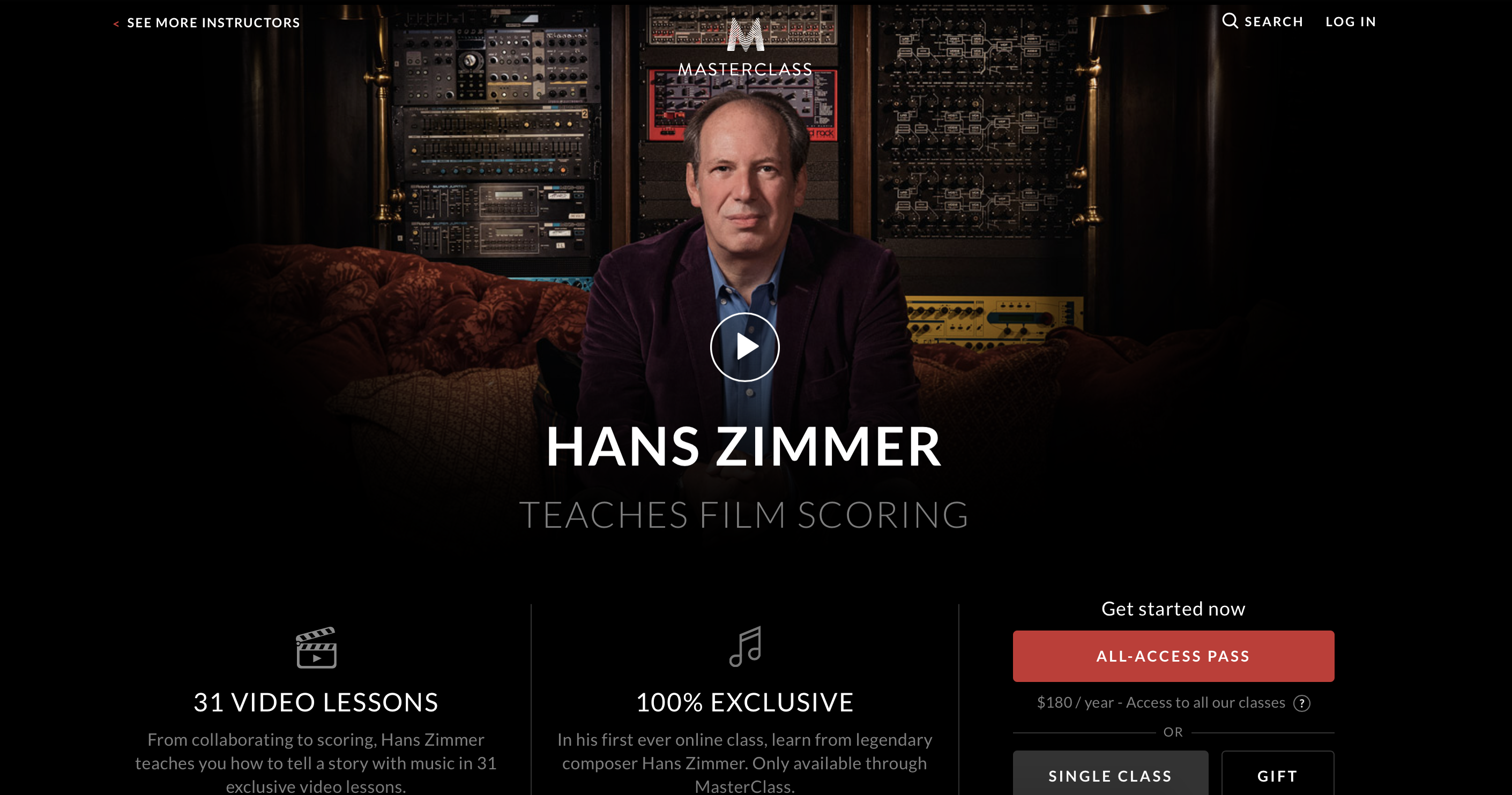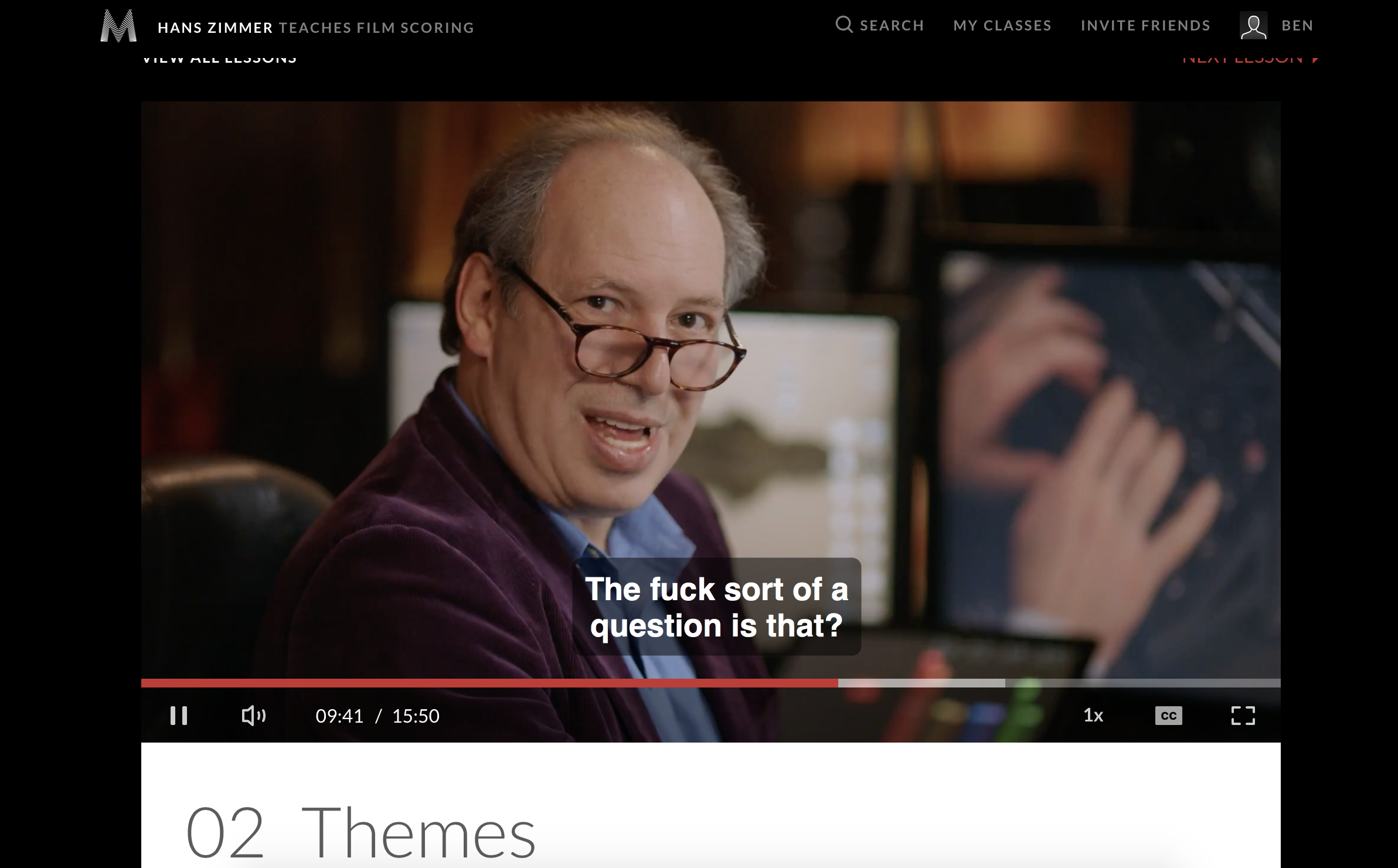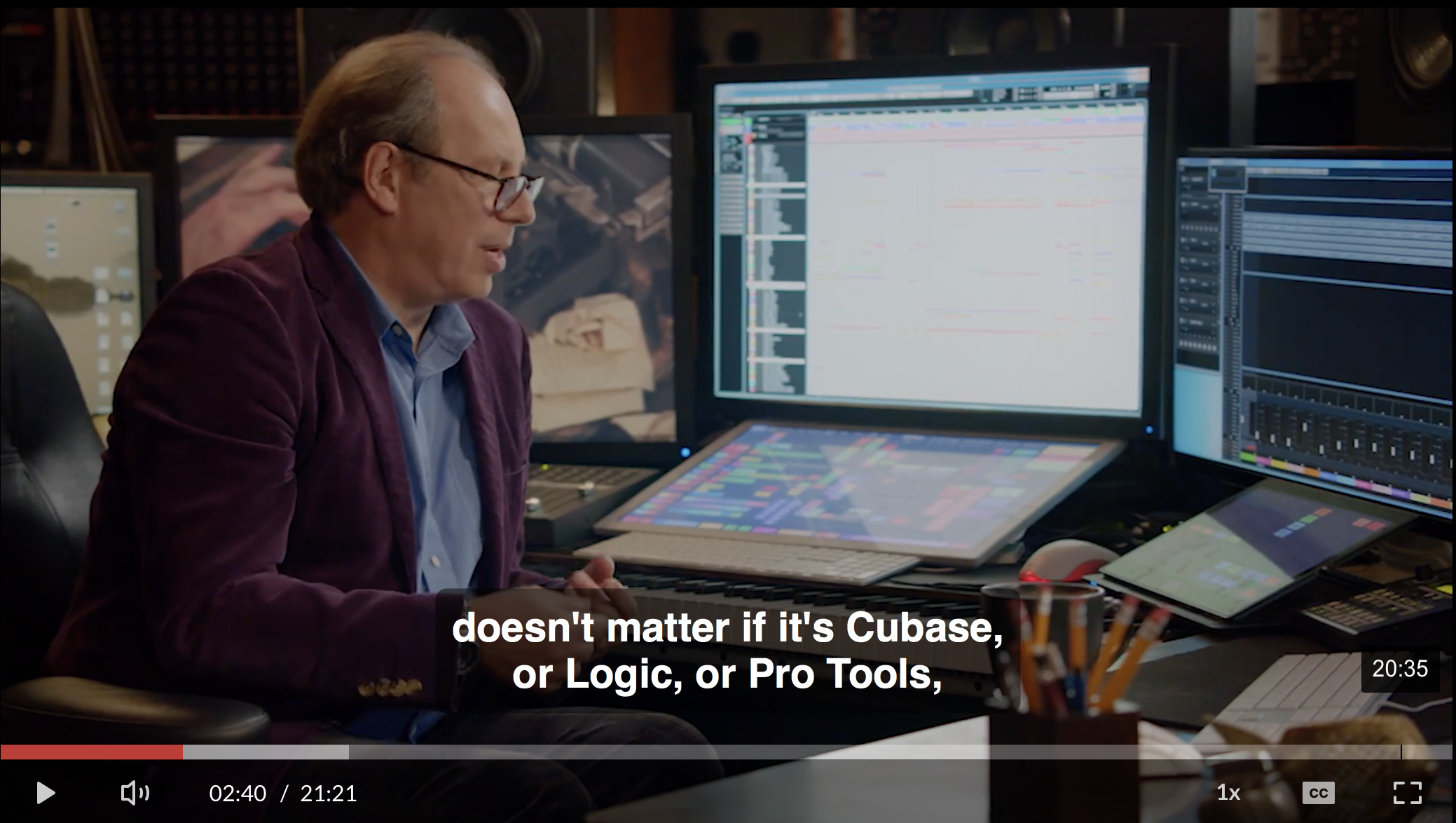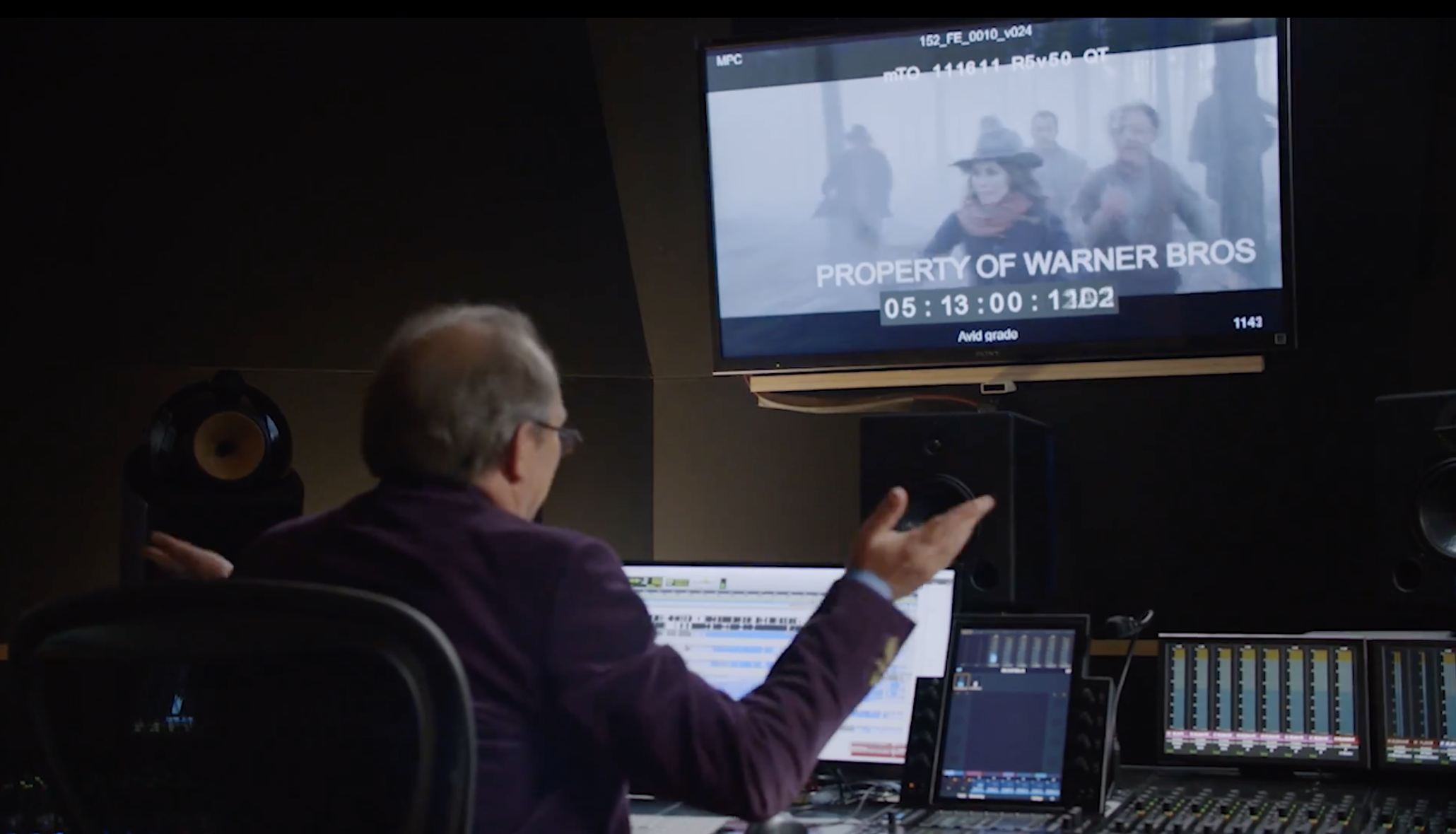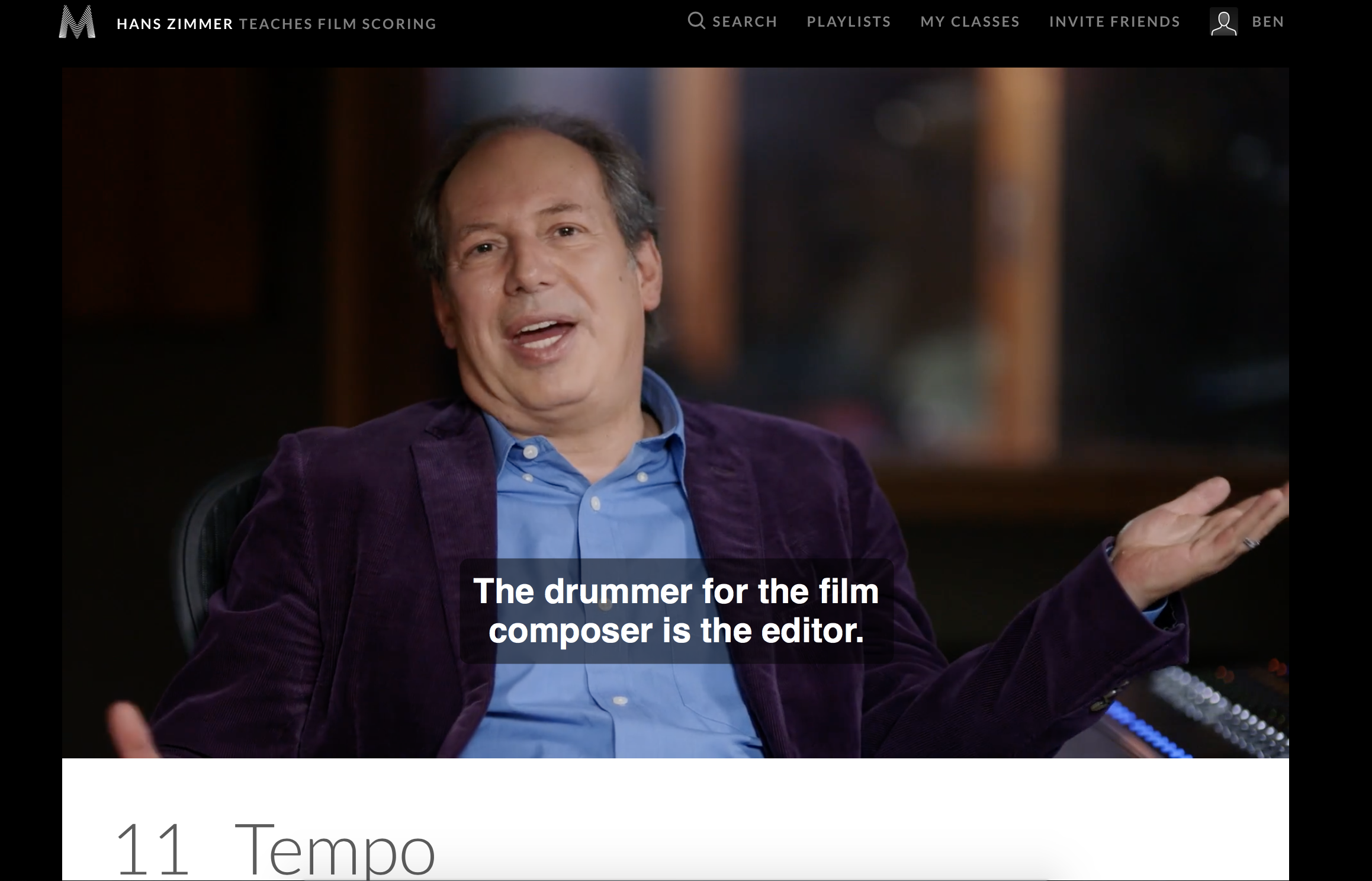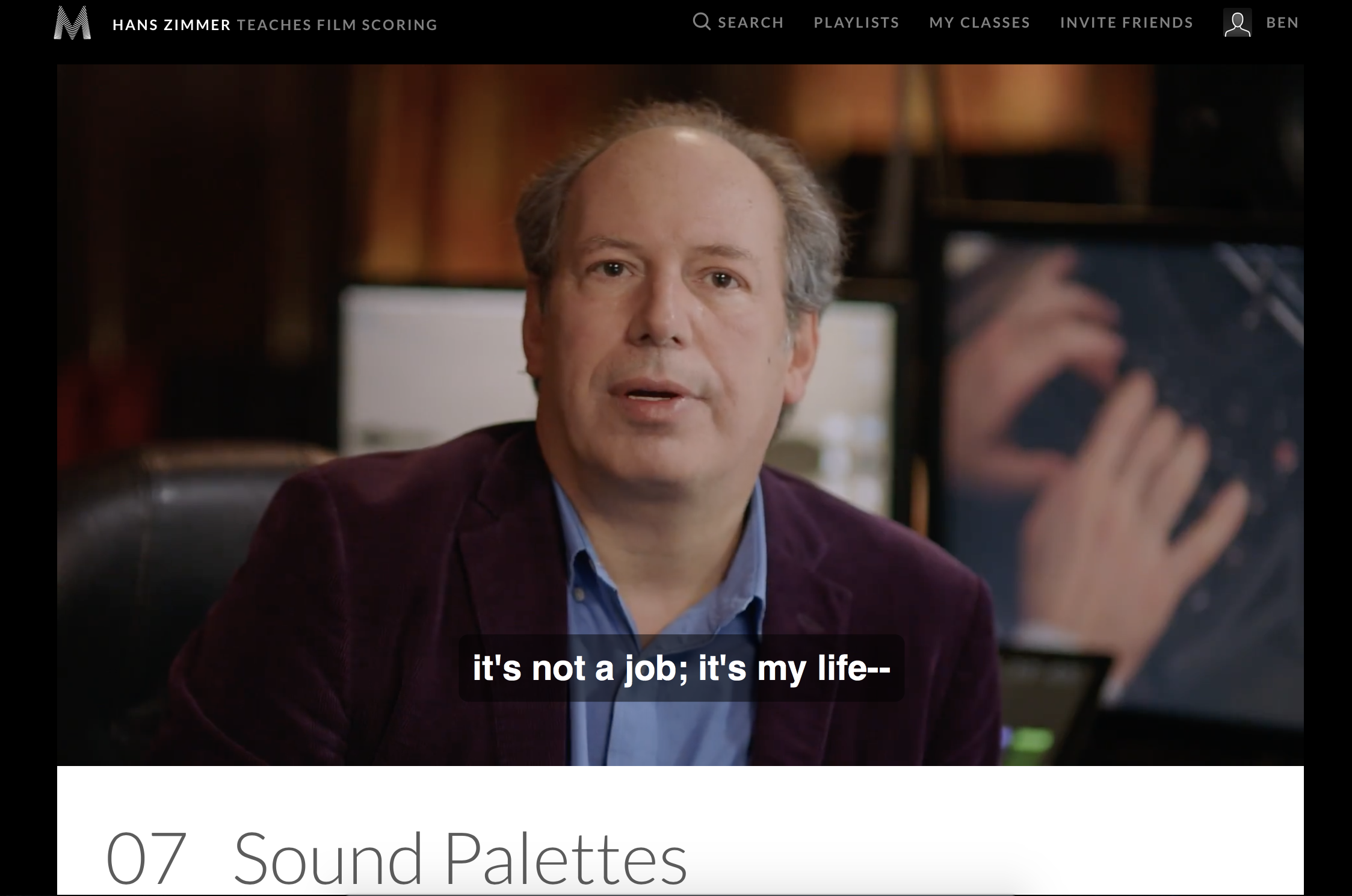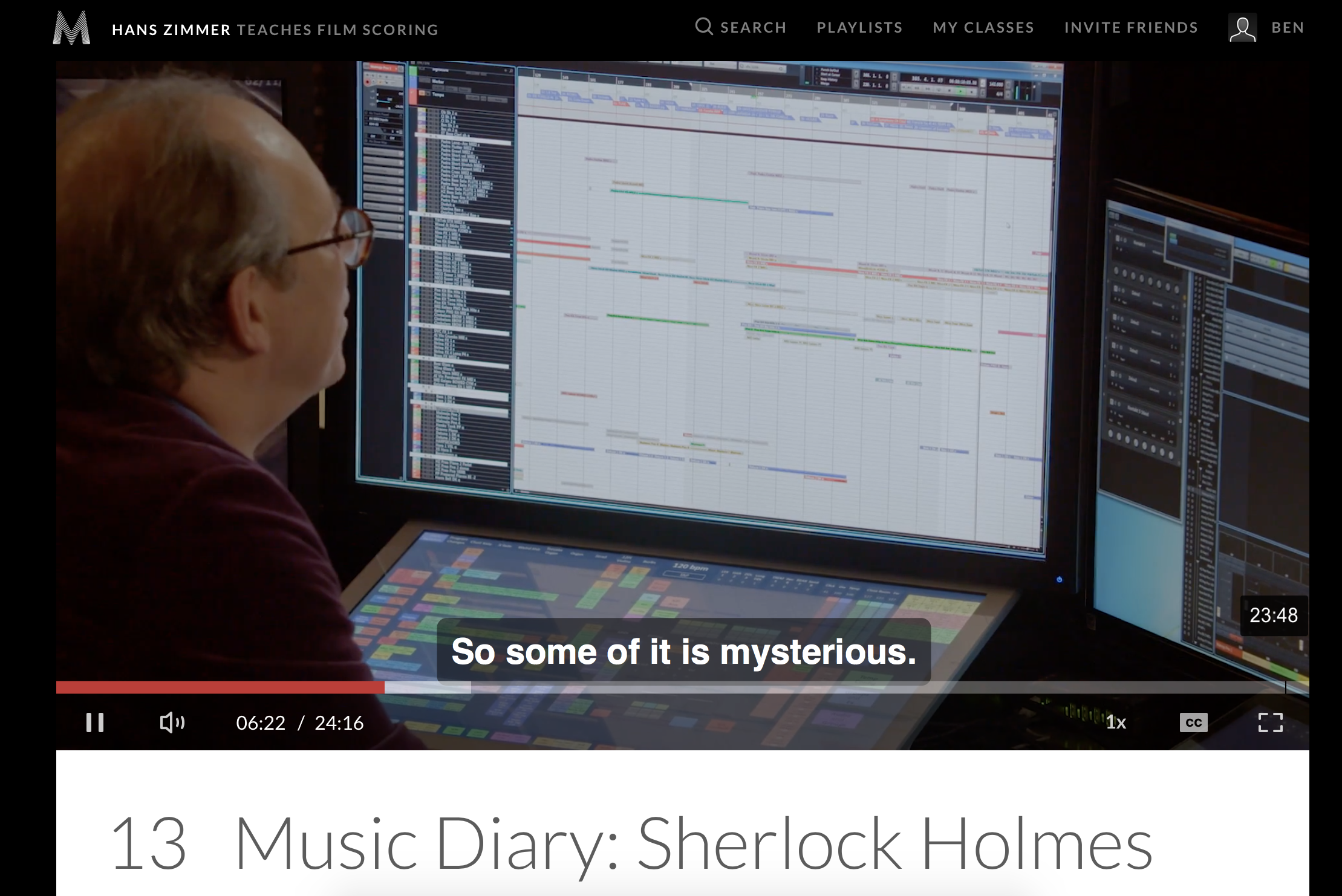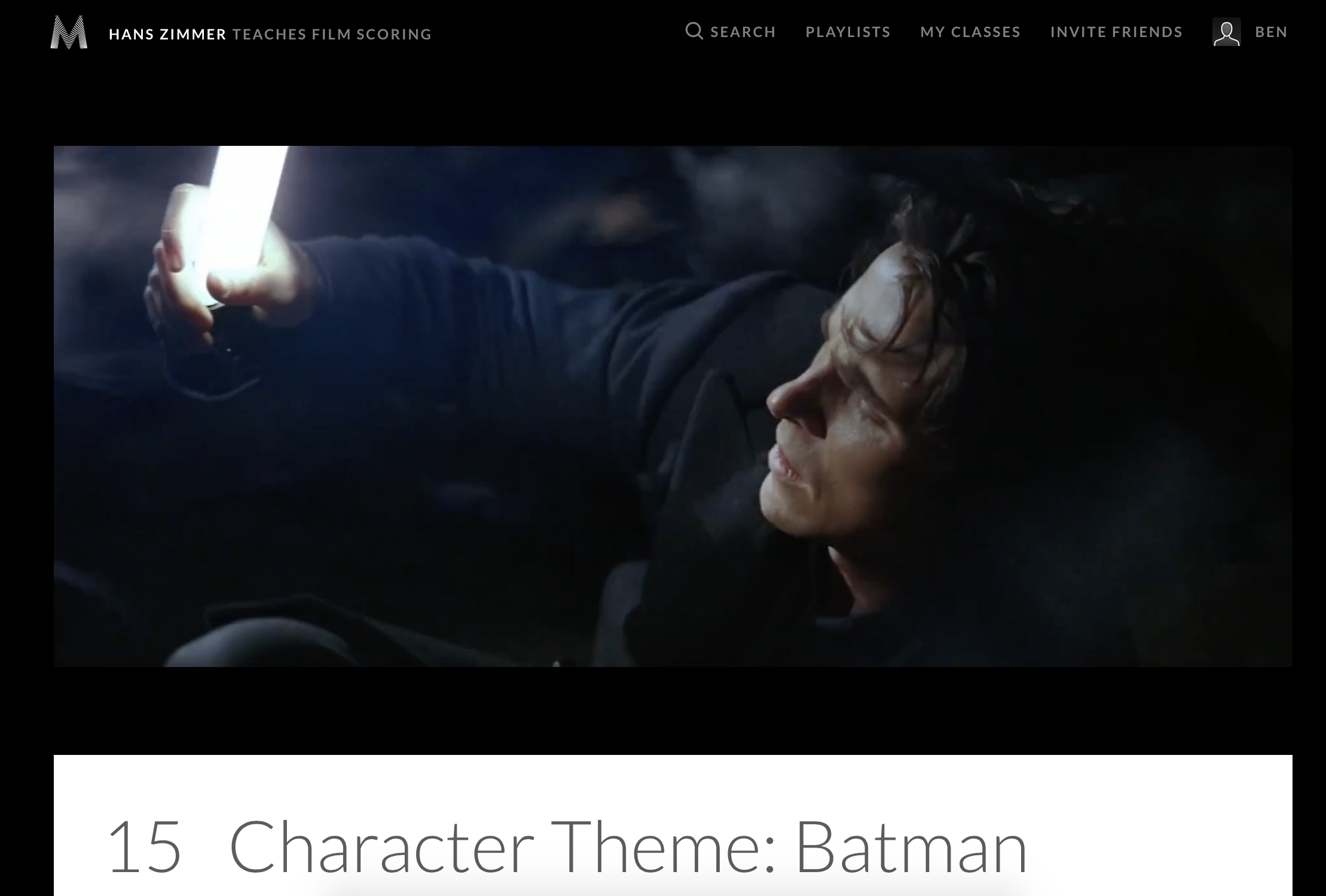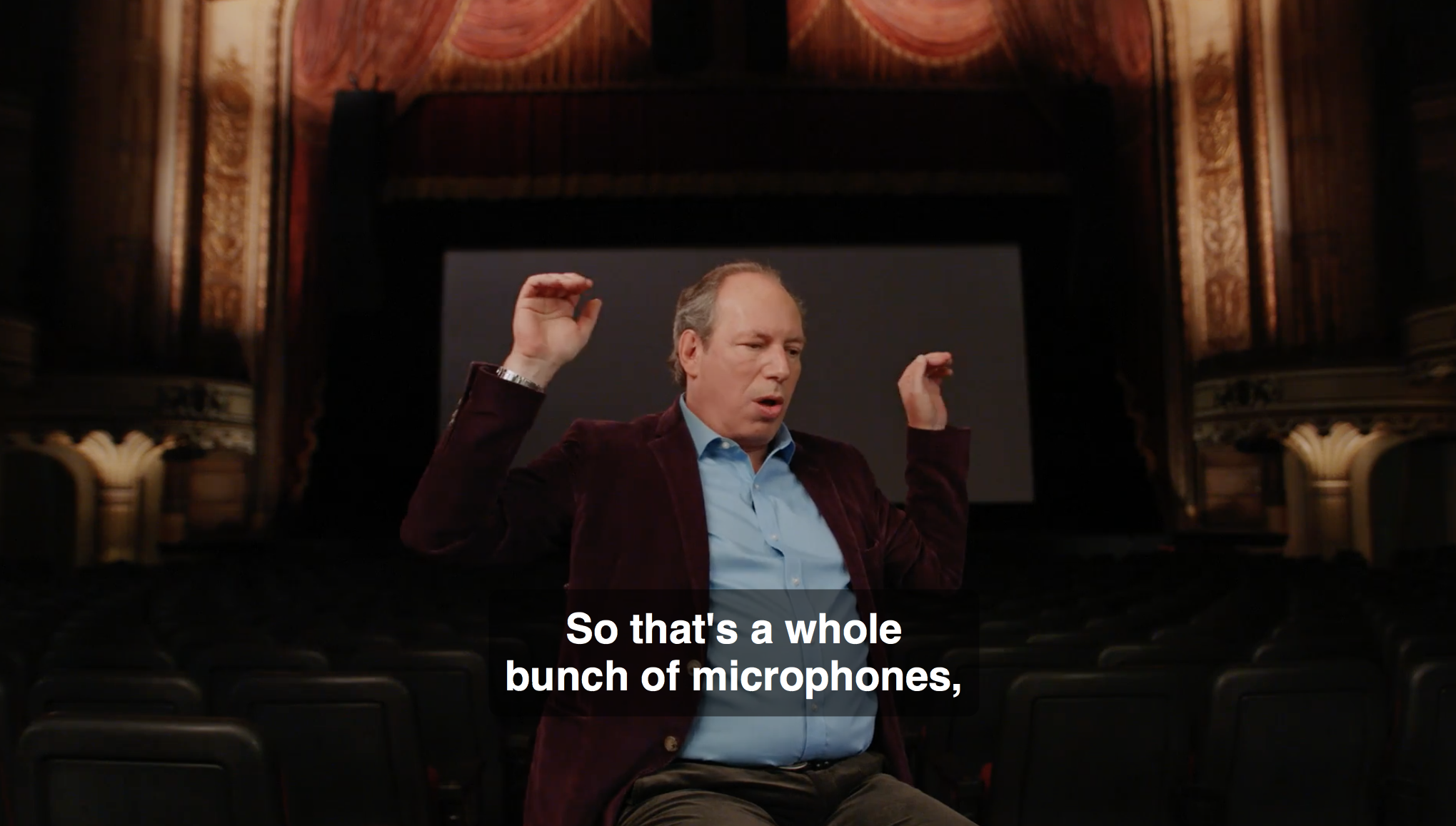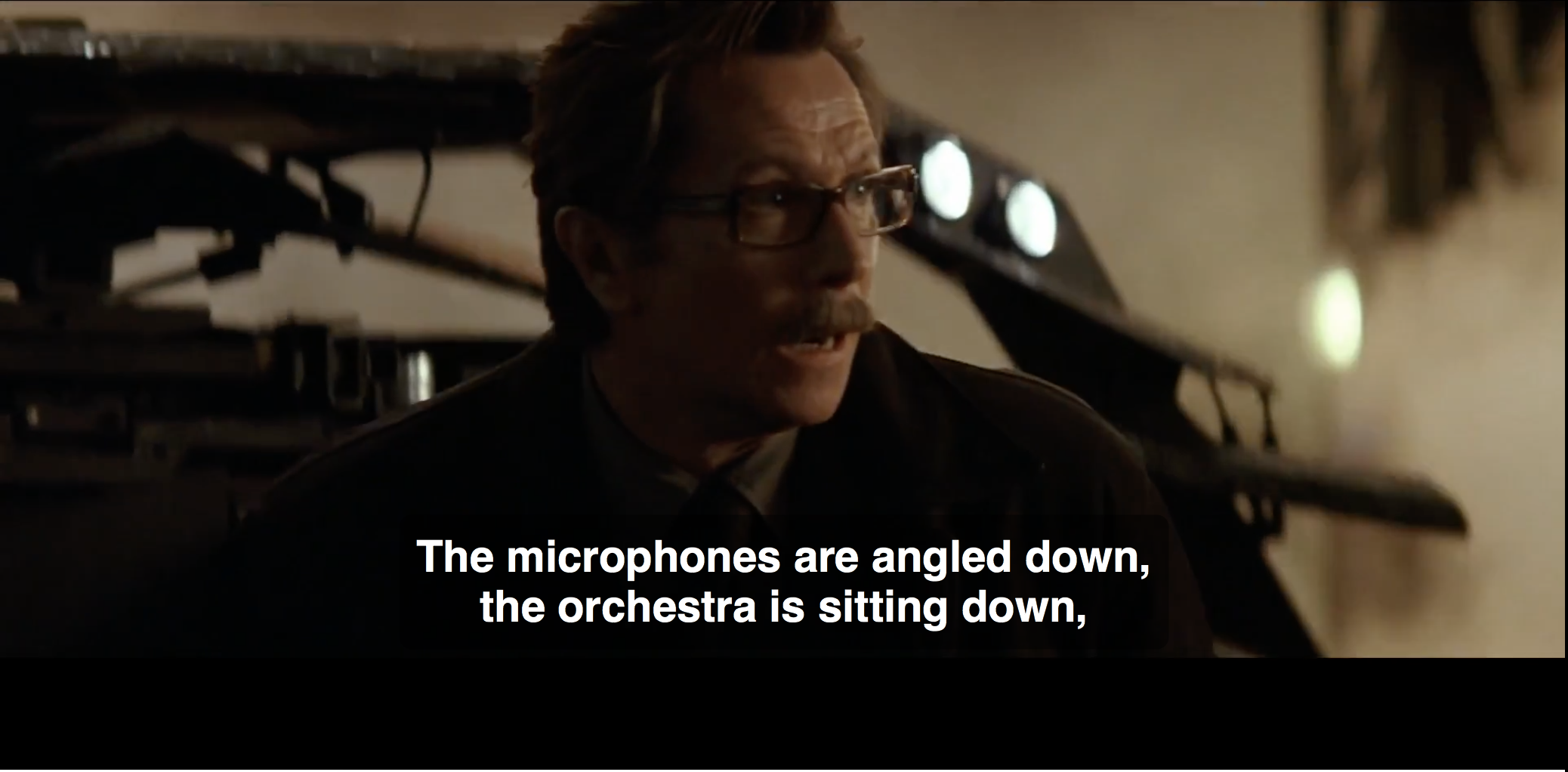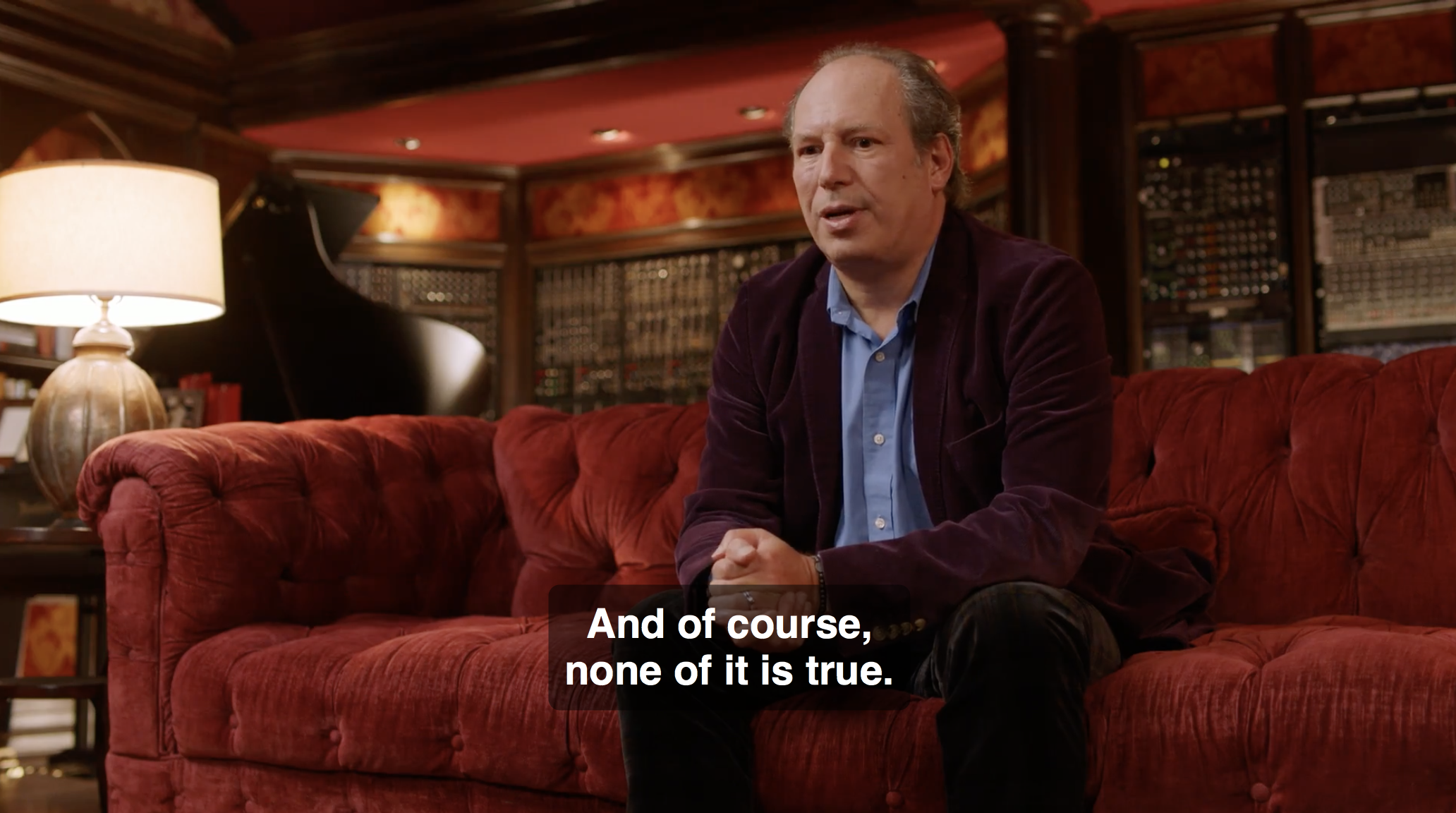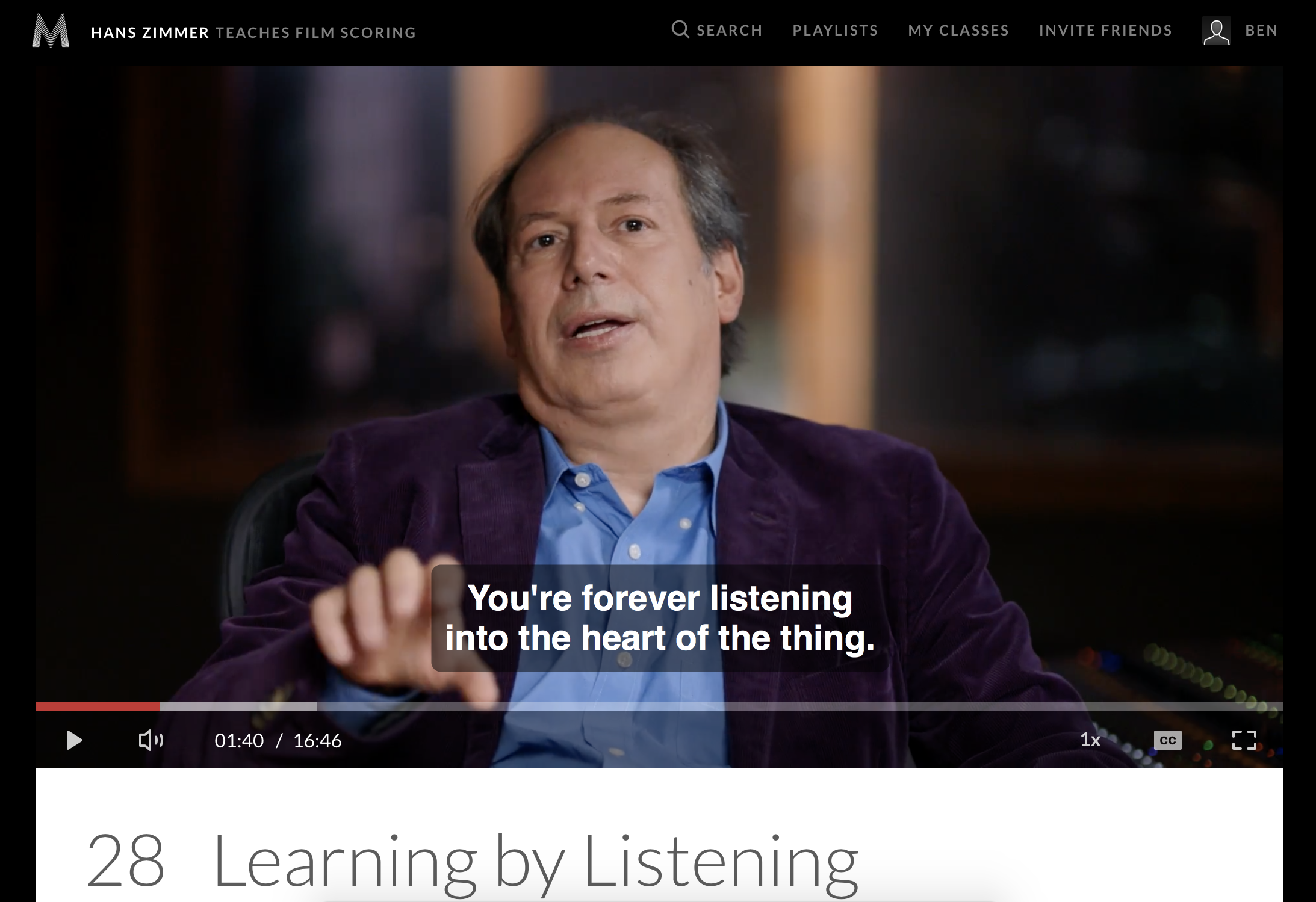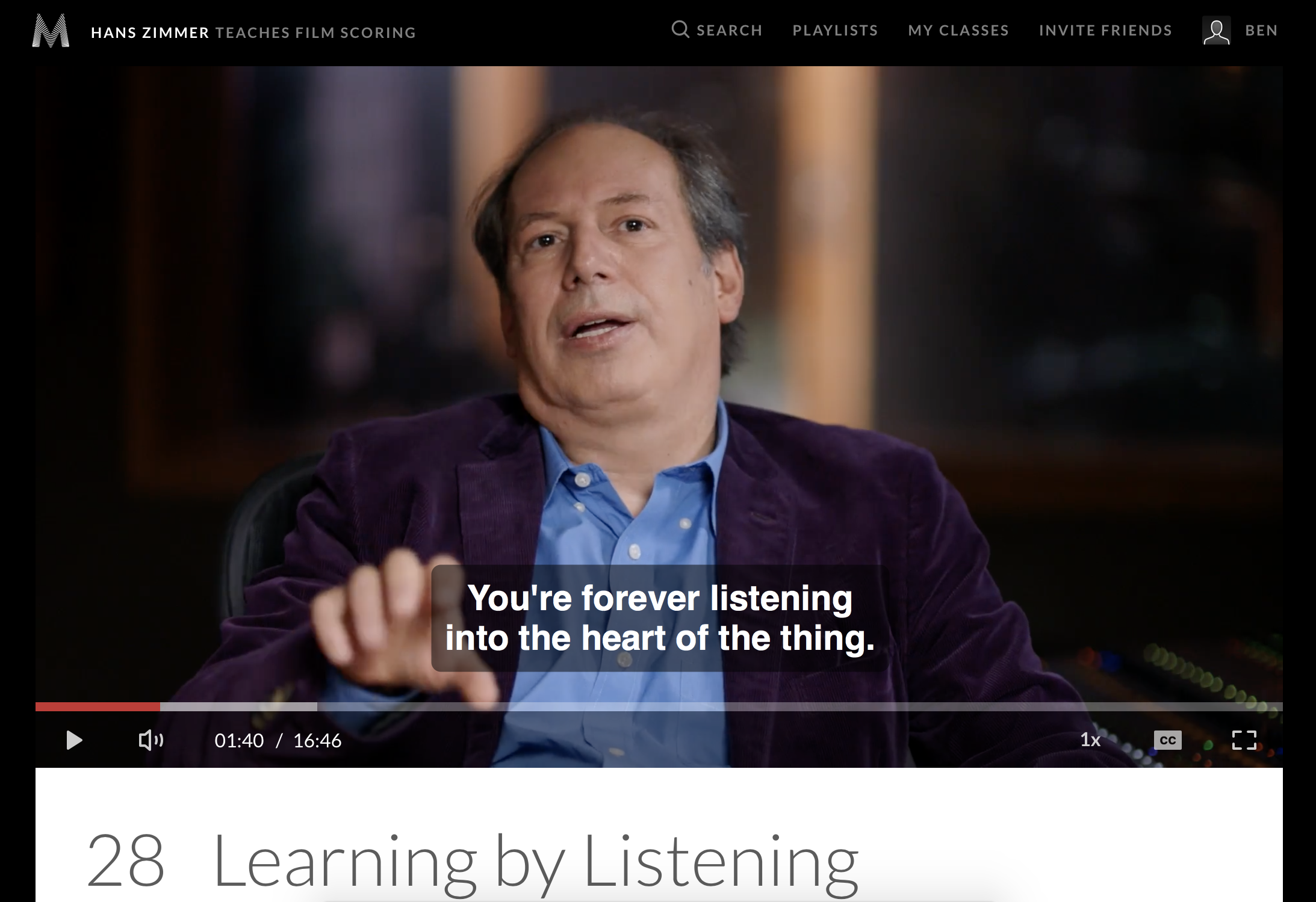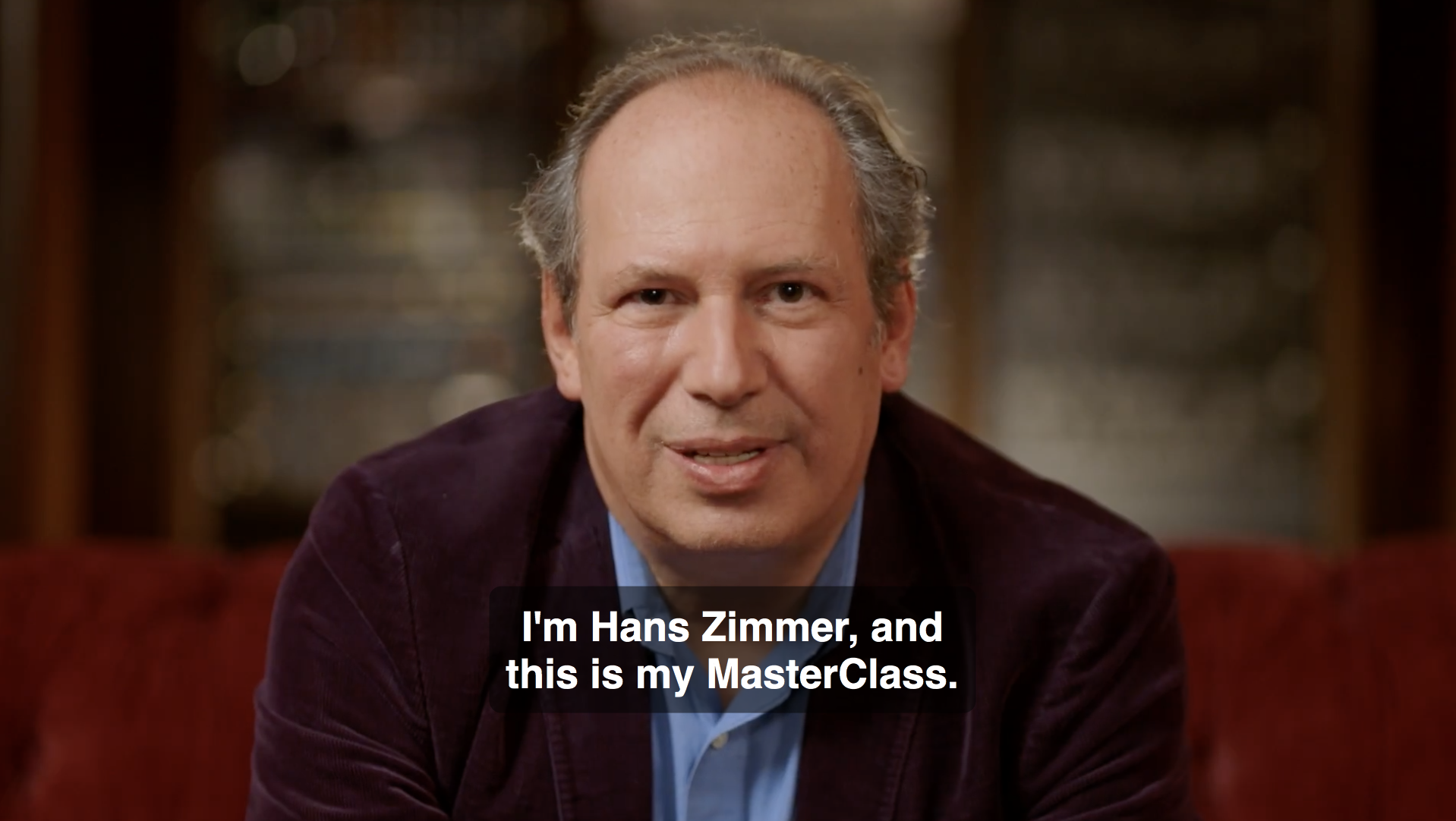I finally got around to the Hans Zimmer Teaches Film Scoring MasterClass! Thanks to my All Access Pass, I have a nice backlog of classes to get through and the Hans Zimmer MasterClass was next up on my list!
I am not a composer or musician but I couldn’t resist getting stuck into the Hans Zimmer Teaches Film Scoring MasterClass for a number of reasons:
- I have huge respect for Hans Zimmer and couldn’t resist learning about his process.
- He’s one of the best film scorers ever and the chance to hear the man behind Sherlock Holmes, Batman, Pirates of the Caribbean, Interstellar, etc. was too good to pass up.
- I’m a storyteller and I’m fascinated to learn about how to tell stories from people who don’t tell them the way I do. I don’t want to just hear about how to create characters from a novelist. I want to hear from directors, actors, and film scorers too.
- The entire MasterClass catalogue has been nothing short of extremely impressive to me and I’ve watched many classes that I will never explore the fields of (like the Chris Hadfield class) simply because they are riveting and I always learn something fascinating I can apply to my own life and craft.
- The class is part of my All Access Pass – so why not? Seems like a waste not to explore everything in this phenomenal catalogue.
So this review will be from the perspective of one who is keen to learn about story, is an avid music and film score fan, and one who has great respect for Hans Zimmer and loves hearing the creative processes of titans.
I’m not a film school or music school student so forgive me for not being able to approach this review from that angle.
So I got my Spotify fired up and ready to play alongside the class and dived in with glee to hear the gems the Academy Award winning composer of 150+ film scorers had to share.
Hans Zimmer Teaches Film Scoring MasterClass Review
The Hans Zimmer MasterClass kicks off beautifully with a lesson on the fine art of themes.
Hans starts by talking about balancing act between originality and suitability to the film, the difference between concert music and music aimed to serve the story of a film, along with fascinating discussions about Beethoven, finding a simple tune, how to choose keys strategically, themes as questions and answers, and then two case studies using Sherlock Holmes and Interstellar.
And even though I’m not a music student, I found Hans’ discussion on why he chooses to write in D exhilarating. It’s not because he’s lazy, but for another very practical reason that has little to do with inspiration.
You can actually express some fairly good things about the human condition in notes that you might not be able to express quite as brilliantly in words.
The masterclass right from the start feels like the perfect balance between tight, precise, well-thought out and prepared information (as you would expect from Hans Zimmer) and a incredibly amiable, relaxing, compellingly bingeable learning experience.
Despite the vast gap separating my status in life from Hans, it really feels like we’re sitting down with an old friend or mentor who wants what is best for you.
It’s really beautiful – even from the perspective of someone not looking to make their own film scores – to watch and listen as Hans plays music and comments and analyses at the same time.
A really joyful experience and something that really helps ground the lessons in practicality.
I always knew that music was the universal language but if anyone were in doubt about that it only takes a few minutes in Hans’ company before the realisation that music is language hits you like a wave.
I actually do wish I could pursue music in-depth as there most certainly are things we cannot express in words – but we can express in music.
Another part I really loved in this first module was when Hans showed us the process behind Interstellar. We learn how the simplicity of the material lets you expand outwards.
If the heart of it, the kernel of it, is intellectually tight, you’ve got something.
Then we start digging into story, which builds upon a very insightful discussion about sticking close to story and actually living and immersing yourself in the world of the story.
Hans when he’s writing a romantic comedy score is a very different person from when he is writing the Dark Knight and becoming the Joker.
There’s also great advice about how to get into the head of the director and how to arrive at a common language (the Ridley Scott Gladiator and Malick Thin Red Line and Pirates examples were particularly interesting), with Hans going into the most unbelievably liberating thing a director can do to help you as a scorer unlock creativity via a new set of rules.
I was going to skip the three-part video modules on working with directors because I was more interested in digging into how Hans creates colour and character with specific case studies.
But then, glimpsing the first few seconds of the first director module, I was hooked (it’s the most important stuff that Hans says in the masterclass) and binged all three modules without knowing where the time went.
You are working with the director. Everybody else is secondary noise. You and the director make a pact that you’re going to do this movie together… even if it means you have to kill him sometimes.
Another nodule of incredibly interesting information that stood out to me was the advice about temp music – actually everything was interesting and I’m sure someone who is in the position where they’re considering temp music or talking to a director about their vision that these modules would be a tremendous help.
I also really loved any of the modules where we were actually sitting in the Gladiator cutting room.
One of the best lessons in the course takes place there and is all about going from war battlefield to laboratory – all in the name of creating great art.
The sound palettes module was another fascinating one.
If you want to know how to create the sound of an entire city in all its different flavours and lights, night and day, like Hans did for Batman’s Gotham City, you’re going to want to pay close attention to this lesson.
Here you learn how to take a cinematographer’s approach (with Hans recommending specific cinematographer’s and resources to study) to creating sounds, almost like you can actually see the sounds themselves.
Hans goes into why every composer should be a student of light and colour when it comes to world-building.
- Check out the Hans Zimmer Teaches Film Scoring MasterClass here.
Then with examples from Sherlock, we also hear how to overcome the baggage of audience expectations that have been built up due to a very long history with that character.
If you pay close attention, Hans’ own unique creative spark – new way of thinking – will begin to rub off on you.
You also get a very interesting insight into how to create the atmosphere of an era through sound, while learning the fine art of sampling with Hans supplying examples of his own – it’s so great to see him blissing out while playing.
Sometimes, the job of the music is as simple as be entertaining.
The module on creating with synths was a long one and went a bit over my head as a non-musician/non-music student.
Hans goes into how he builds his sonic palettes from scratch for each and every film and takes us by the hand as he builds his sounds from the ground up.
And, my goodness, this was an exhilarating creative process to watch.
I can imagine anyone with a serious real vested stake in becoming a film scorer is going to be swept away by this module alone.
The module on scoring to picture was another fascinating insight into Hans’ process – a process that is clearly defined, easy to comprehend, and simple to replicate.
We learn where to start with theme and sound and how to build freshness into familiar structures.
This is all about how to score different scenes – act three is going to be scored differently from the first act because you’ve got the pay-off that’s been building since the beginning, for example.
It doesn’t matter that you’ve just written the nicest and most beautiful piece of music of your career. If it interferes with the story, bin it, chuck it, throw it in the trash.
In the module on tempo, Hans uses Sherlock as a case study, and goes into how to follow the editor as your guide when introducing drums into the score.
Hans shows a specific method for this process of scoring and, again as a non-music student I’m going to say that while interesting, the fact is that this section is so hands-on and practical that this is really going to be useful if you’re ready right now or in the near future to put it into practice.
If you want concrete tips on mastering technique – little hacks, so to speak, for getting into your film scoring with the effectiveness of a surgeon – you’ll find them in this class.
The module on keeping a music diary (another one long in length and deep in content) – again, using Sherlock Holmes to concretely illustrate all the points – will be fascinating to all creatives (not just those who want to be film scorers) and I picked up a bunch of practical tips that will serve me in my writing craft.
Then the character stuff really gets inspiring.
Hans breaks down the two ways you can get to learn the characters in a film – but he warns you against one of the methods, which is the wrong way of learning the characters.
This is an exhilarating discussion built around the principles of backstory and reliability.
You then get three whole lesson dedicated to constructing a character theme with examples from Batman, the Joker, and Jack Sparrow where, once again, Hans breaks down his process into every small detail and shows you where to start and how to put it all together.
- You can learn more about the Hans Zimmer MasterClass here.
As a writer, I particularly enjoyed the in-depth two-part modules on writing tips.
Now, once again, a ton of this went into the nitty-gritty technical detail that only musicians would understand, and as such, apart from it being fascinating insight to a film buff like me, a lot went over my head.
Yet I could see the value in it for film scorers, or any kind of musician actually, because there was a ton of valuable stuff that I personally took away as a writer.
The philosophy underpinning the technicalities is what helped me personally and I can see these modules being worth the price of entry alone for a lot of creatives.
If you’re struggling with writer’s block, for example, this two-part module will bust you right out of that.
Hans is full of practical tips that will help propel you to new creative heights.
Fledgling filmmakers will particularly like how Hans discusses budget and other limitations and how to overcome different obstacles to the creative process.
Then we get into one of my favourite modules in this masterclass: learning by listening.
This module, another biggie, is one easily worth the price of entry alone.
Once again, I say that as someone who has no ambitions to be a film-scorer.
But the philosophies underpinning Hans’ discussions here are extremely easy to transfer to any other art form.
As a writer, I still come back time and again to learn how to read – how to truly see what an author is doing – and Hans here is giving a lesson on how to hear – how to listen beyond the notes being played.
As a music fan, someone who was a DJ for a while in college and considers themselves a bit of a connoisseur, this lesson alone was worth the price of entry for me because it allowed me to suddenly appreciate my favourite albums in a completely new, deeper, richer, more fulfilling way.
Once again, I can only imagine how valuable it would be to a fledgling musician, someone who wants to write their own music.
You also get a mini listening syllabus where you can immediately apply the principles to Hans’ own recommended works of art.
To be honest, I’m speechless.
But I expected nothing less from a MasterClass.
I’ve taken enough of them already, thanks to my All Access Pass, to know I’m getting something of exceptional quality with each course.
I’ve already got all this value and I still have so much more to dig into like… scoring under dialogue, in-depth case studies from Frost/Nixon looking at dialogue and The Dark Knight looking at tension, working with musicians, feedback and revisions, audience feedback, lessons learned from Hans’ own journey through the art of film scoring, what life as a film scorer looks like, and more.
If you’re a musician, creative of any kind, a fan of Hans’, or have any film scoring ambitions whatsoever, I really recommend you check out the Hans Zimmer Teaches Film Scoring MasterClass. It’s superb on every level.
You can learn more about the Hans Zimmer Teaches Film Scoring MasterClass here.
